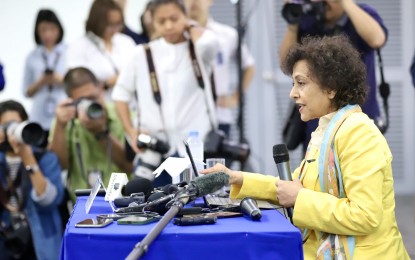
'POSITIVE SIGNALS'. United Nations Special Rapporteur Irene Khan speaks to reporters in a press conference in Mandaluyong City on Friday (Feb. 2, 2024). Khan said she saw "positive signals" in the current human rights situation in the Philippines, citing the release of former Senator Leila de Lima and other developments. (PNA photo by Robert Oswald P. Alfiler)
MANILA – Visiting United Nations Special Rapporteur Irene Khan said she saw "positive signals" in the current human rights situation in the Philippines, citing the release of former Senator Leila de Lima and other developments.
“The administration of President (Ferdinand) Marcos Jr. has set a tone on many issues that were of concern in the recent past,” Khan said in a press conference on Friday, marking the end of her 10-day Philippine visit to assess the status of free speech in the country.
“The decision to reopen the peace talks, the release of former Senator Leila de Lima, the acquittal of Nobel Laureate Maria Ressa on tax fraud charges are all positive signals,” she added.
On freedom of opinion and expression, Khan said she gave several recommendations to the Philippine government, including adopting laws on the protection of journalists and human rights defenders amid concerns of red-tagging and violence raised by stakeholders she met during her visit.
Khan also suggested the issuance of an “executive order” that sets “very clear measures” to be taken to discourage red-tagging.
She said she also called for the abolition of the National Task Force to End Local Communist Armed Conflict (NTF-ELCAC) during an exit conference with government officials at the Department of Foreign Affairs on the same day.
Khan said the government side has explicitly “reassured” her that it does not encourage nor endorse red-tagging.
The UN expert also took note of the Department of Justice’s measures to strengthen the investigation and prosecution of violence against journalists and human rights defenders but asked the government to further strengthen the Administrative Order (AO) 35.
AO 35 is a government mechanism that brings together various agencies of the government against impunity.
Also part of her recommendations include the "proper adoption” of legislation in line with international standards for access to information and the placement of freedom of expression at the center of a soon-to-be-released Philippine National Human Rights Plan.
Meanwhile, she asked the government to look into the issue of media ownership monopoly and adopt rules “aiming at limiting the disproportionate influence of a single person or entity”.
Khan said the UN is ready to help strengthen the country’s human rights protection efforts.
“The international community is ready to support the Philippines to strengthen its human rights and to ensure that the Philippines goes back to its past glory as one of the very few Asian states that actually signed the adoption of the Universal Declaration of Human Rights in 1948,” she said.
“The Philippines has great history, however, whether meaningful steps will be made towards reaffirming the Philippines’ human rights commitments depends on political will,” she added.
‘Legal remedies available’
National Security Council Assistant Director General Jonathan Malaya said the Philippines has legal remedies for people who feel aggrieved by alleged red-tagging.
"We said to her that there are legal remedies available for people who feel like they are aggrieved by red-tagging. We relay to her that individuals who fear that they are red-tagged can file a case in court,” he said.
“They can go to court and file libel cases or oral defamation cases, or can file cases with the Ombudsman if these are public servants or public officers," he added.
Malaya noted that cases can be filed before the Civil Service Commission as well as administrative cases with their respective government agencies.
He reiterated that the government does not have a policy on red-tagging.
"We do not condone or encourage red-tagging, and in fact, there is no government order, policy issuance, or law that makes red-tagging a policy of (the government)," he said. (with Priam Nepomuceno/PNA)
